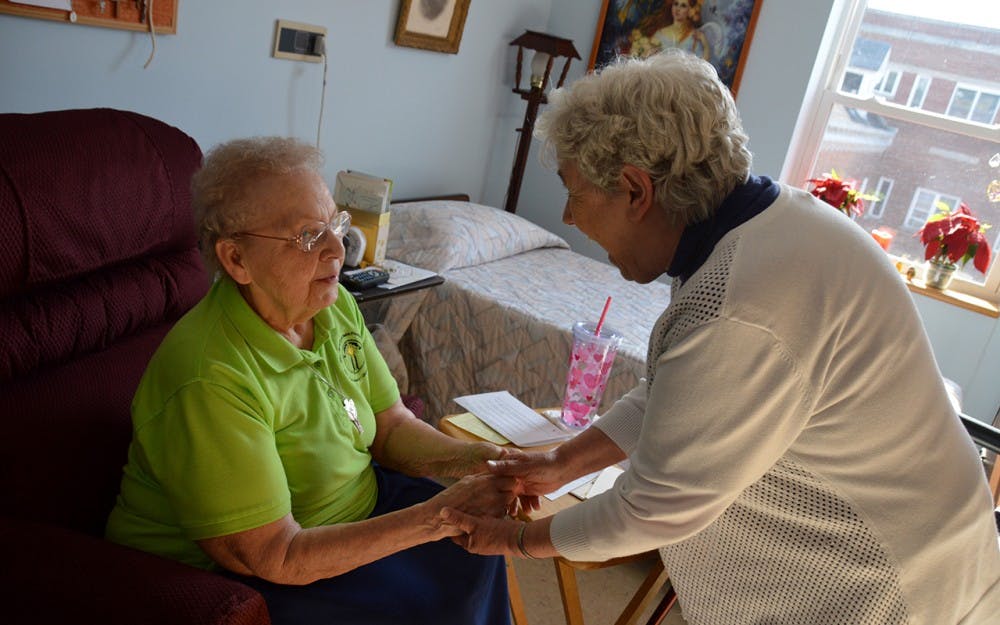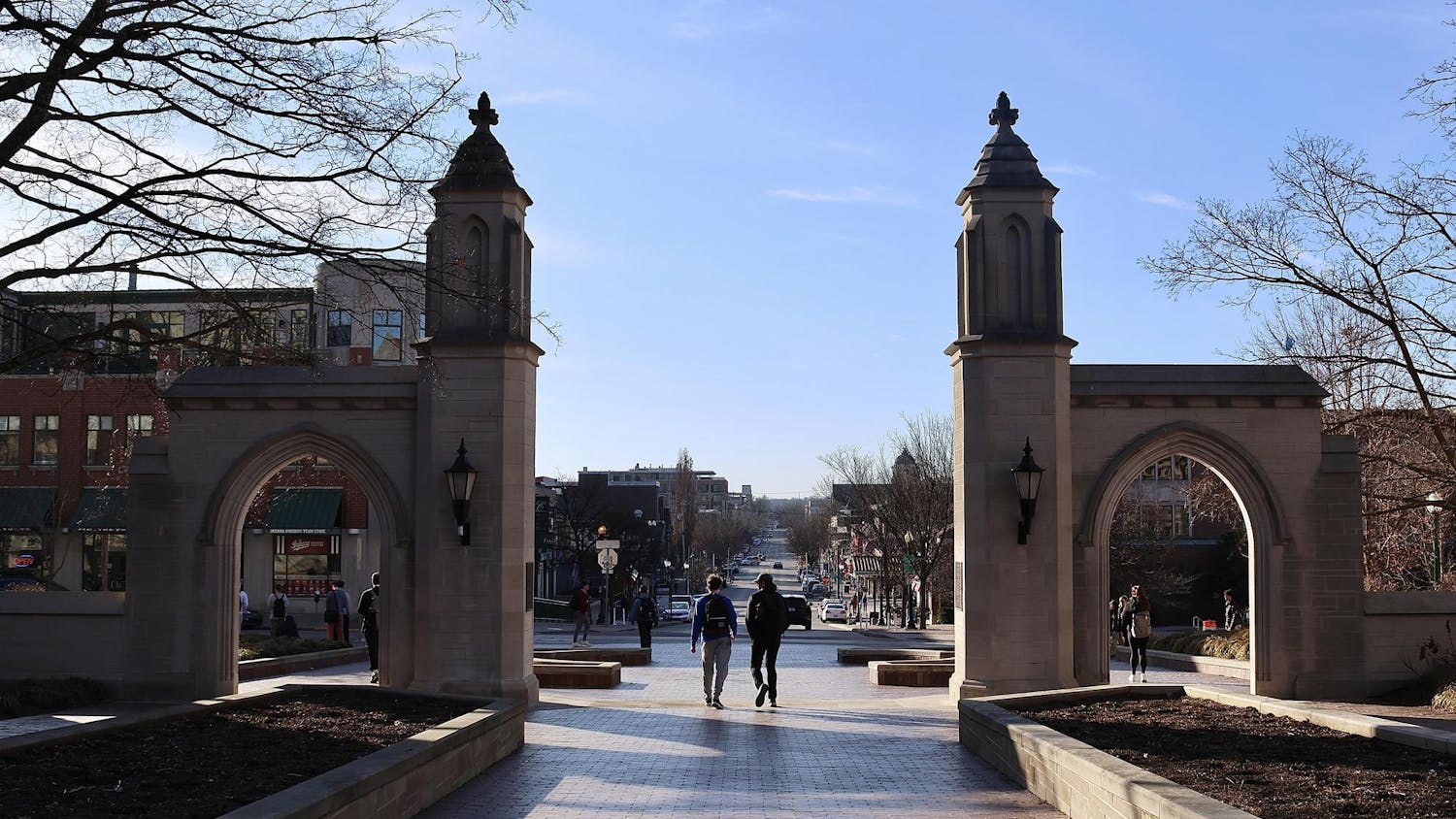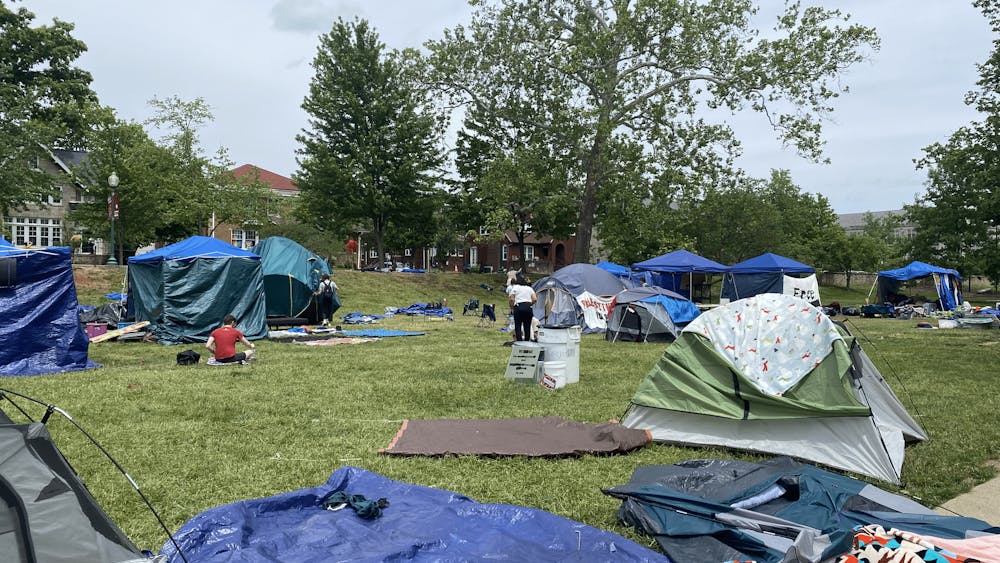OLDENBURG, IN — Sister Alacoque Burger stands by herself in what was once a chapel of perpetual adoration. It is silent as ever but not for the quiet of prayer. It is the silence of emptiness.
Just outside the stained glass windows, leaves turn and fall. Today at the Oldenburg Franciscan Center, there are not enough young nuns to fill the adoration shifts.
In this same spot, at 2 a.m. in 1965, Alacoque was a novice at the motherhouse. She prayed for every sister who was on a mission and every one who was ill or dying, and she was not alone.
***
Only three sisters of St. Francis in Oldenburg died in 2016. Ordinarily, that number would be three or four times greater. Some say the nuns hold on because they won’t go without seeing completion of renovations to their home. Some say it’s just the Lord’s will.
“We’re all in the sacrament of waiting,” Alacoque said. “We’re standing together.”
Some of those nuns standing together have lived between 90 and 100 years. Some don’t wear habits anymore. Some cannot farm and dance and teach quite like they used to. Some cannot walk. Some cannot talk. So they live in the upper floors of St. Clare Hall, where Sisters Evelyn Forthofer and Alacoque orchestrate their pastoral care.
Over the past 165 years, the Oldenburg Franciscan Center has seen about eight generations of shifting religious life. Alacoque and Evelyn have witnessed three.
Over the last two generations, the number of religious sisters has fallen steadily from almost 180,000 in the United States to just more than 47,000.
There may not be enough sisters to fill the adoration chapel these days, but nuns are never abandoned on their last days. Transitus Sisters undertake the honor of witnessing the transition into eternal life. Leading the Transitus Sisters are Evelyn and Alacoque.
***
The sisters take the elevator to the third floor of St. Clare Hall, over which Alacoque presides — Evelyn takes charge of pastoral care on the second. The first room they enter belongs to Sister Gloria, who lies flat on the bed in a vibrant pink sweatshirt and cupcake-print socks. Her hair has turned wispy and white, and much of it has departed to reveal a pinkish scalp. She smiles.
A sophomore from Marian University sits at her side and practices osteopathic medicine, which focuses on the body’s ability to heal itself.
“Are you Catholic?” Alacoque asks.
The young woman pauses, and Gloria remains silent.
“I am for now,” the student says. “Because of Marian.”
“Say you’re Franciscan,” says Alacoque, referring to the religious order to which she and Evelyn belong. “You’ll always be Franciscan. It’s in your blood.”
“Your bone marrow,” adds Evelyn.
The room is quiet except for the hum of the television across the room. A live stream of the church next door is idle now. There are no songs or prayers. Still, it comforts Gloria, who could not make it to morning mass.
She likes the young 20-somethings from Marian and the young 60-something nuns and this screen, which allows her to be a young nun again.
As Alacoque and Evelyn bustle down the hall, they spot Sister Francis Assisi. She was their formation director.
She rests in a chair in the middle of the hall.
Alacoque leans in toward Francis Assisi.
“We love you,” she breathes.
She kisses her former teacher on the forehead. Francis Assisi cannot say it back, but a gentle blinking reciprocation comes from behind large eyeglasses.
She loves them, too.
Evelyn often tells the nursing staff how each of the nuns once looked — beautiful, vibrant — and how each of the nuns once were — strong in body as well as spirit.
Their habits concealed smooth curls. Their smiles calmed classrooms full of children. Their hands, now showing bone and veins, once wrote histories and delivered babies in the mountains of Papua New Guinea.
“This is how I see them,” she says. “I want you to see them.”
Sisters Michael Ann Aubin and Angela Betsch were born in the middle of the Roaring ‘20s, and Mary Laurel Hautman toward the end of the Great Depression. They entered religious life in their late teens. They taught school for more than 115 combined years.
Michael Ann later oversaw the cancelled postage stamp collection ministry. Mary Laurel took sabbatical at Prayer Lodge in Montana, where she immersed herself in Native American culture. Angela spent four years teaching children in Tari, Papua New Guinea.
In 2016, they died at the ages of 92, 81 and 90, but the months leading to their deaths were only miniscule pieces of their lives. Evelyn says it would be a shame if that’s the only portion someone knew.
***
Alacoque spots Gloria making her way down the hall and throws her hands up.
“You radiate,” Alacoque says.
The corners of Evelyn’s mouth turn downward just slightly as she nods in agreement. The two approach the sister, who now uses a walker, and speak briefly before departing for the stairwell.
Evelyn wants to know when Gloria started to use a walker. Alacoque says she may have fallen recently, but she isn’t sure. Evelyn says she won’t use a walker yet — it’s a matter of pride. Alacoque says she only sometimes uses a rollator.
They say they’re still young enough to take the stairs, so they do.
At the end of the second-floor hall is a small shrine to Our Lady of Guadalupe. Sister Carmela lives in the room next to it now, but originally the shrine and the room belonged to Sister Carmen de Barros.
“When the end comes, I want peace and quiet so I’m ready to meet my God,” Carmen had written about her preference of time of death.
That is what she received, in the presence of Evelyn, one of her best friends, and others who loved her.
Alacoque and Evelyn get onto the elevator and ride it to the first floor. They make their way into the lobby. A series of large boards that can be flipped like a photo album is marked, “We Remember.”
They turn through the names. The boards click as they meet each other. Helen Saler. Click. Karla Barker. Click. Laurencia Listerman. Tick. Angela Benedict. Tock. So many more.
Alacoque wonders which one she’ll be like. She wonders if she’ll get dementia. She wonders if shame will show in her eyes when she takes to walkers and says, “I can’t remember.”
“Even though I forget you, will you remember me?” too many aging sisters have asked.
***
They write letters to their residents’ families. They meet with nurses. They volunteer at the local food pantry. They hoist their elders from a van to the emergency room. By the end of each day, Alacoque and Evelyn are dragging, but when Alacoque sits in her chair at night, she says to herself, “Blessings, blessings, blessings.”
They sit in an office now, telling stories of taking sisters to the hospital together, of helping nuns accept the loss of their drivers’ licenses and independence, of sisters who taught them about literature and selflessness.
Alacoque travels through a spiral-bound notebook marked with more than 100 cursive names and dates of death. Some had been on their floors for years.
“Oh, we have memories of these ladies,” Alacoque says. “Oh yes, indeedy.”
Alacoque and Evelyn go back to their childhoods and discerning and praying through adoration shifts in the chapel.
Everything has changed, Alacoque says. The priest faces the congregation and speaks in languages people understand. Retreats are more personal. People contact Evelyn by email, and she hates it — sitting at her desk takes away from her time with the sisters.
Evelyn looks out the window and says it’s just like the leaves. It has to happen. The diminishment of each sister and the fading of their type of religious life.
“After the tree has let go, that tree needs trust just like we do,” she said in a November meeting. “Once you know you have to let go, you have the grace to do it. I have the grace to do it, and those leaves of trust start growing.”
For now, Alacoque and Evelyn help their sisters to find that grace, but when it’s their time, who will help them?
Their fingers point at one another.
“She will,” they say.
They’ve always planned to push one another’s wheelchairs.
They slap their knees and share a laugh.
“We live in trust,” Alacoque says. “We’re going to be cared for. We’re going to be respected and shown dignity.”
The specifics she cannot say, but she believes religious life will go on in a different way.
As new leaves come back in the early months of 2017 and Easter approaches, Alacoque finds Sister Veronica coloring a butterfly in her room. Veronica began painting at the age of 96, and now Alacoque puts her art in the hall for all to enjoy.
It’s a sign of new life.
Editor's note: This story shows only the pastoral care ministry conducted by two sisters at the retirement community of the Oldenburg Franciscan Center. There are Franciscan sisters in Oldenburg and around the world who are active in many types of work, from hospital mission integration directing to farming. For more information about the Sisters of St. Francis in Oldenburg, visit oldenburgfranciscans.org.






